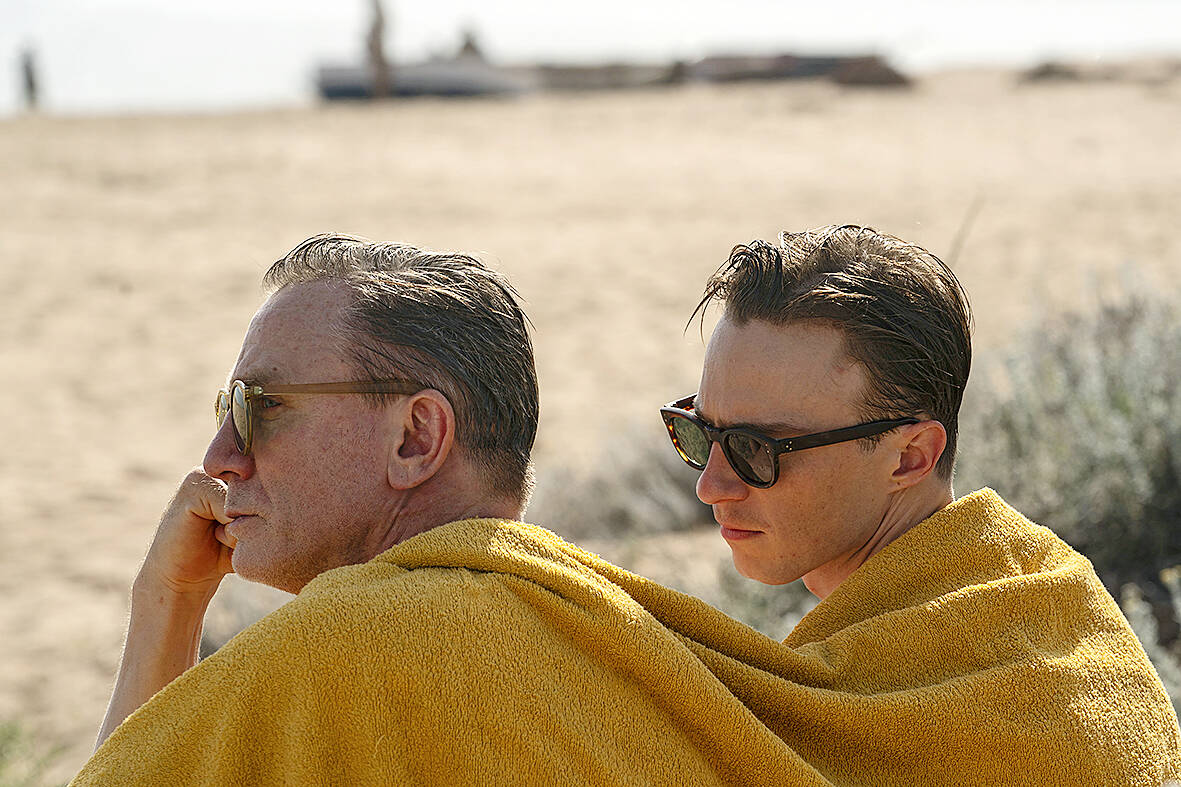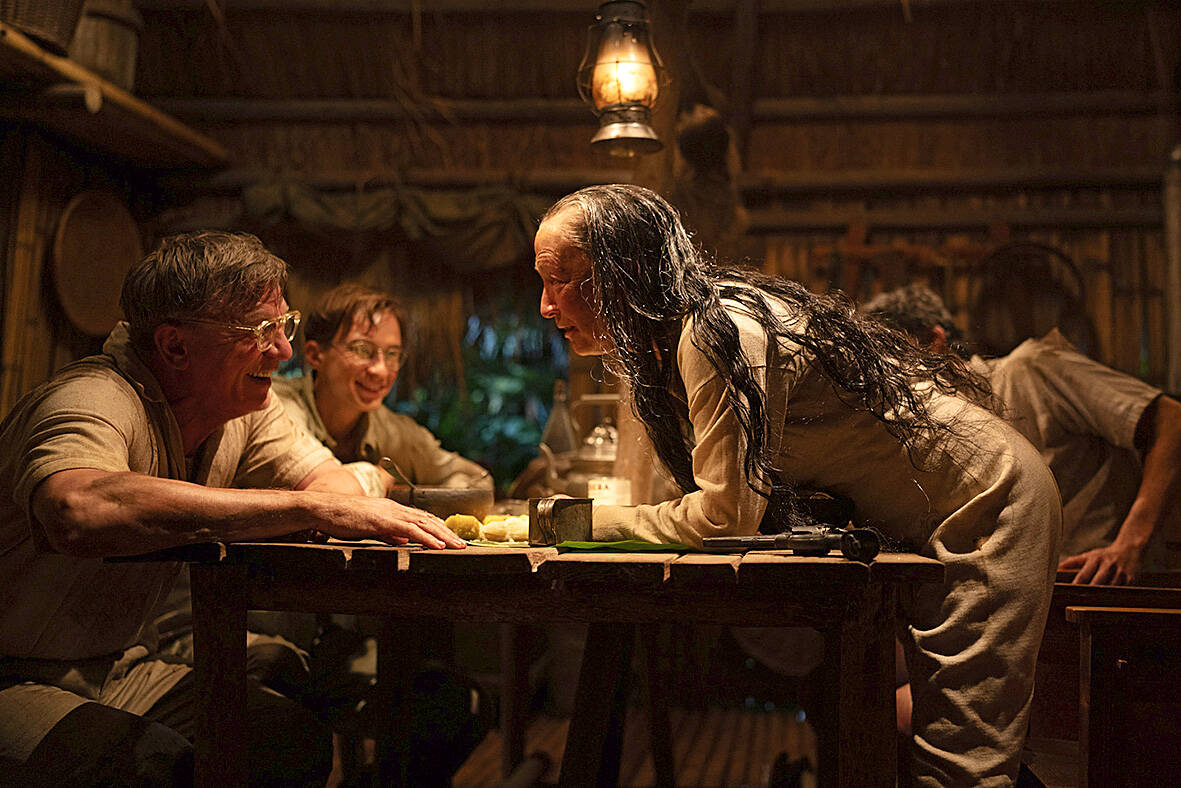One of the first real signs that Queer is going to be an unconventional movie is when Daniel Craig in a linen suit saunters through Mexico City during the early ‘50s and the soundtrack blasts a song by Nirvana.
It’s a pretty nifty way to explain this story of a man unmoored by time, geography and himself. Craig plays William Lee, an American hiding out in Mexico who spends his time going from bar to bar, knocking back tequila or mescal.
Why is he hiding out? For one thing, he’s a junkie and Mexico is more permissive about heroin use than the States at this time. He’s also gay when being gay was abhorrent and Mexico was, again, more permissive. Lee is part of a wealthy expat contingent that fritters away the days stewed in liquor and gossip.

Photo: AP
He doesn’t just sound like a William S. Burroughs hero, he’s partly Burroughs himself — Queer was a confessional novella written long before his breakthrough novel Naked Lunch. So buckle up. You’re going to see some weird stuff.
Queer is best when it’s a character study of Lee, who in Craig’s hands is charming, selfish, arrogant, abrasive, foppish and sometimes unable to read a room. It’s a million miles from 007, even if Lee carries a pistol. Craig allows us to see the yearning for real love that Lee numbs with shot glasses and needles. That Nirvana song is Come as You Are.
One day that real love suddenly appears in the form of the younger Eugene Allerton (a superb, icy Drew Starkey), who unlocks something in Lee. Could Eugene be the one to make Lee whole? Could they ride off into the sunset? Don’t be silly. This is a Burroughs story.

Photo: AP
Eugene is on-again, off-again, sometimes loving Lee and sometimes preferring a woman’s company. Part of Eugene seems to dislike Lee or being seen with him. Lee’s voracious need — shown with vigorous lovemaking scenes — is overpowering.
One scene has the two men walking down a street and Eugene subtly shakes off the older man’s hand on his shoulder. “Is he a queer?” Lee asks a friend. “I can’t tell.” One drunken night he approaches his source of adoration and confesses he wants to speak without speaking. He soon will try.
Director Luca Guadagnino and screenwriter Justin Kuritzkes, who teamed up for Challengers, face enormous challenges in adapting Burroughs’s words to the screen and yet they manage it, lyrically.

Photo: AP
There is a single-take scene in which Lee assembles the equipment necessary to inject himself with heroin and the camera watches as he gets high, slowing his body down to become a sort of pathetic statue at the kitchen table.
Symbols — a wriggling bug, snakes and mirrors — combine with trippy techniques meant to show Lee’s interior life, like his arm superimposed onto a scene tenderly touching his paramour when, in reality, it is hanging still. And there is a late moment of surreal beauty as the lovers climb into each other’s bodies, hands under the skin.
Queer — broken up into three chapters and an epilogue — gets trippier in the later stages, when Lee and Eugene leave Mexico in search of a South American plant that apparently gives users telepathic powers. Lee is clearly trying to find a shortcut into the soul, bypassing the messiness of human interactions.

Photo: AP
“You think it can fix things for you,” he is told.
But this part isn’t well integrated with the first half, almost like a movie fragment, and the filmmakers fumble an attempt to deal with the death of Burroughs’ wife, Joan Vollmer. Guadagnino seems to unnecessarily channel Stanley Kubrick as the movie wobbles to its end, with scenes filled with deafening sound, then pregnant silence and an artificial momentousness.
The score by Trent Reznor and Atticus Ross is vibrant but it gets a chef’s kiss with the addition of songs by Prince, New Order and Lydia Mendoza, mixed with contemporary songs by Benny Goodman, Eddie Cantor, Frankie Lane and Cole Porter.
The weight of it all comes down to Craig, and he’s a wonder in a fedora, dirt stains on his linen pants. Queer is a reminder of how good an actor he is and how brave he can be — naked, needy and noxious. You’ll be shaken and stirred.

A vaccine to fight dementia? It turns out there may already be one — shots that prevent painful shingles also appear to protect aging brains. A new study found shingles vaccination cut older adults’ risk of developing dementia over the next seven years by 20 percent. The research, published Wednesday in the journal Nature, is part of growing understanding about how many factors influence brain health as we age — and what we can do about it. “It’s a very robust finding,” said lead researcher Pascal Geldsetzer of Stanford University. And “women seem to benefit more,” important as they’re at higher risk of

Eric Finkelstein is a world record junkie. The American’s Guinness World Records include the largest flag mosaic made from table tennis balls, the longest table tennis serve and eating at the most Michelin-starred restaurants in 24 hours in New York. Many would probably share the opinion of Finkelstein’s sister when talking about his records: “You’re a lunatic.” But that’s not stopping him from his next big feat, and this time he is teaming up with his wife, Taiwanese native Jackie Cheng (鄭佳祺): visit and purchase a

Experts say that the devastating earthquake in Myanmar on Friday was likely the strongest to hit the country in decades, with disaster modeling suggesting thousands could be dead. Automatic assessments from the US Geological Survey (USGS) said the shallow 7.7-magnitude quake northwest of the central Myanmar city of Sagaing triggered a red alert for shaking-related fatalities and economic losses. “High casualties and extensive damage are probable and the disaster is likely widespread,” it said, locating the epicentre near the central Myanmar city of Mandalay, home to more than a million people. Myanmar’s ruling junta said on Saturday morning that the number killed had

Mother Nature gives and Mother Nature takes away. When it comes to scenic beauty, Hualien was dealt a winning hand. But one year ago today, a 7.2-magnitude earthquake wrecked the county’s number-one tourist attraction, Taroko Gorge in Taroko National Park. Then, in the second half of last year, two typhoons inflicted further damage and disruption. Not surprisingly, for Hualien’s tourist-focused businesses, the twelve months since the earthquake have been more than dismal. Among those who experienced a precipitous drop in customer count are Sofia Chiu (邱心怡) and Monica Lin (林宸伶), co-founders of Karenko Kitchen, which they describe as a space where they